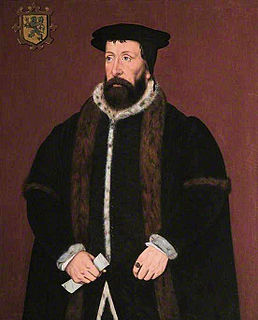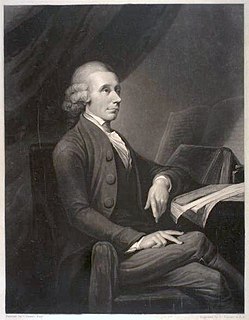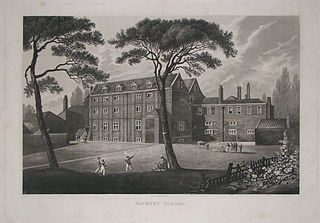Related Research Articles

Sir John Mason was an English diplomat and spy.

The Theological Repository was a periodical founded and edited from 1769 to 1771 by the eighteenth-century British polymath Joseph Priestley. Although ostensibly committed to the open and rational inquiry of theological questions, the journal became a mouthpiece for Dissenting, particularly Unitarian and Arian, doctrines.

Newcome's School was a fashionable school in Hackney, then to the east of London, founded in the early 18th century. A number of prominent Whig families sent their children there. The school closed in 1815, and the buildings were gutted in 1820. In 1825 the London Orphan Asylum opened on the site. Today the Clapton Girls' Academy is located here.
William Rutty M.D. (1687–1730) was an English physician.

Thomas Rackett (1757–1840) was an English clergyman, known as an antiquary.
Aulay Macaulay was a Scottish writer and clergyman of the Church of England.
Walter Needham (1631?–1691) was an English physician, known as an anatomist.

Robert Walpole (1781–1856) was an English classical scholar.
Hugh Moises was a noted English schoolmaster.

The General View series of county surveys was an initiative of the Board of Agriculture of Great Britain, of the early 1790s. Many of these works had second editions, in the 1810s.
The Phytologist was a British botanical journal, appearing first as Phytologist: a popular botanical miscellany. It was founded in 1841 as a monthly, edited by George Luxford. Luxford died in 1854, and the title was taken over by Alexander Irvine and William Pamplin, who ran it to 1863 with subtitle "a botanical journal".
References
- ↑ "Fellows of the Royal Society". London: Royal Society. Archived from the original on 16 March 2015.
- ↑ Stephen, Leslie, ed. (1887). . Dictionary of National Biography . 9. London: Smith, Elder & Co.
- ↑ "Cecil, Henry (CCL770H)". A Cambridge Alumni Database. University of Cambridge.
- ↑ Appleby, R. H. (1999). "Sir Alexander Crichton, F.R.S. (1763-1856), imperial Russian physician at large". Notes and Records of the Royal Society. 53 (2): 219–230. doi:10.1098/rsnr.1999.0076. ISSN 0035-9149.
- ↑ "Morton Eden". Oxford Dictionary of National Biography (online ed.). Oxford University Press. doi:10.1093/ref:odnb/8453.(Subscription or UK public library membership required.)
- ↑ Lee, Sidney, ed. (1891). . Dictionary of National Biography . 27. London: Smith, Elder & Co.
- ↑ "John McDonald". Oxford Dictionary of National Biography (online ed.). Oxford University Press. doi:10.1093/ref:odnb/17440.(Subscription or UK public library membership required.)
- ↑ Lee, Sidney, ed. (1893). . Dictionary of National Biography . 35. London: Smith, Elder & Co.
- ↑ Lee, Sidney, ed. (1894). . Dictionary of National Biography . 37. London: Smith, Elder & Co.
- ↑ Hull, G. (1998). "Caleb Hillier Parry 1755-1822: a notable provincial physician". Journal of the Royal Society of Medicine. 91 (6): 335–338. doi:10.1177/014107689809100618. PMC 1296785 . PMID 9771526.
- ↑ "Pelham, the Hon. Thomas (PLHN773T)". A Cambridge Alumni Database. University of Cambridge.
- ↑ "Smith, Robert, Lord Carrington (SMT819R)". A Cambridge Alumni Database. University of Cambridge.
- ↑ "Michael Symes". Oxford Dictionary of National Biography (online ed.). Oxford University Press. doi:10.1093/ref:odnb/26880.(Subscription or UK public library membership required.)